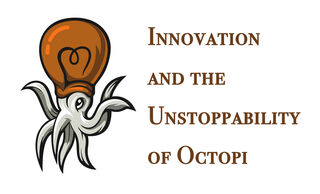Creativity
Innovation and an Unstoppable Inky the Octopus
A Personal Perspective: Learning the art of resilience from nature.
Posted October 13, 2021 Reviewed by Lybi Ma
Key points
- What Inky the octopus can teach us about organizational resilience.
- Success has always required profound patience, wisdom, flexibility, and the ability to squeeze through tight (economic) spaces.
- Two new leadership capacities are vital for survival and success—developing cohesive group perception, and the power of hope.

Recently, I thought on the issue of delayed progress—a condition that many have been experiencing due to the pandemic—which I think has pretty much affected everyone on the planet. Usually, I’m pretty “unstoppable,” but after 18 months of non-stop COVID-related setbacks, my personal unstoppability battery definitely needs a recharge. As I meditated to gain insight about this issue, I received from my subconscious an image of—an octopus?
I did what anyone would do when stymied by hopefully synchronistic input from the subconscious, I googled “octopus” to see what kind of archetype this might be. But my search for a Jungian dream symbol soon led to a delightful news story from a couple of years ago, of Inky, an octopus that escaped an aquarium in New Zealand by climbing out of his tank, slithering 10 feet across the floor, and squeezing through a 6" drainpipe 164 feet long to finally plop into the bay, and freedom.
This was amazing. Talk about innovative thinking. My resilience battery was immediately recharged by reading about Inky’s great escape; it reminded me that great success has always required profound patience, clarity of vision, penetrating wisdom, flexibility, and the ability to squeeze through tight (economic) spaces. We need to figuratively make our way through a very long drain pipe. But to make it to the ocean, every arm has to work together, to use every ounce of our power to squeeze our way to success, and to the freedom to do something amazing in the world.
Every sucker on an octopus can lift about 40 pounds, so combining them makes the octopus bizarrely powerful. In a drainpipe, even though only that forward arm could possibly sense the goal of the open ocean in some way, all the other suckers and limbs must act in alignment to make the seemingly impossible possible.
But the tale of Inky contains a message for our societal awareness as well. Consider the possibility that we are collectively the octopus and that the pandemic is a kind of decentralized prison, with all of us quarantined in our respective tanks. Now, the only way to freedom is like a very long drain pipe where we need to work together. The ocean is a return to normal, where we can hug each other, travel, restart the economy, and otherwise enjoy life without worrying about spreading a disease that will kill us or a loved one.
And here’s the key for an octopus seeking a great escape: If a single arm gives up, then the entire octopus would be 12.5 percent less able to achieve such an extraordinary goal. Thus we can assume that every arm is “in it to win it.” However, with human beings and pandemics, the effect of non-contributing elements has an outsized effect, simply because the negative impact of non-participation is exponential.
For example, to achieve herd immunity or efficacy for contact tracing apps, those who negate the participation principle will achieve an amplified impact. For example, with contact tracing apps, if 10 percent of the population refuses to install and use them, that minority of non-participators don’t reduce our power to just 10 percent, the negative impact is doubled to 20 percent. And if 30 percent of the population refuses to use them, then efficacy drops to under 50 percent—which is roughly the minimum required efficacy for a vaccine to be approved for deployment.
But let’s focus on something more relevant: How you and your company can make it through the drainpipe to the other side of the pandemic. Let’s briefly explore what it takes—in terms of vision, strategy, and culture—to not only survive the worst economic downturn in a century but also use the end of the pandemic as a springboard to success.
The bottom line: What’s needed is a new kind of leadership for the 21st century, and this pandemic is really an opportunity for developing it. Inky the octopus and the pandemic have shown us that two new capacities are vital for survival and success—developing cohesive group perception, and the power of hope.
Let’s talk about the first new capacity, cohesive group perception. This is more than just “collaboration.” Developing the ability to see reality more clearly together, is how you can increase the speed of business model evolution. Having a limb that promotes a false reality is the absolute worst thing to deal with as you’re making your way through a drain pipe. The ability to achieve cohesive group perception is also a prerequisite for consensus-driven evolutionary governance models.
Finally, the pandemic is yet another opportunity to see that hope holds power. There is a deeper reason that 65 percent of U.S. workers are looking for a new job because it isn’t really about looking for more compensation, or even better benefits. Employees have been clear that they deeply value non-monetary benefits that are aligned with increasing life meaning and purpose, and this is supported by expanding flexibility, career growth, well-being, and upskilling.
Therefore, if you have a project or venture you’re nursing, and you’re running out of steam, it’s important to remember that the vast majority of startups are actually pretty pedestrian. If your goal is to increase clickthrough for web advertising, or improve the "stickiness" of some social networking service, or make it easier to pay for your pizza, it may be time to think a little bigger. Consider the possibility of expanding your thinking to pivot your venture into something that could someday save a million lives, or lift a million people out of poverty, or shift the way humanity functions at a fundamental level—to achieve a higher level of social cohesion and efficiency. I call this process the billionification of a half-baked idea, the last step of an effective venture design sprint.
Finding your life purpose is the deepest source for both organizational resilience and breakthrough innovation, refining your product or service concept so radically that it could actually help bring about an evolutionary leap for humankind. Perhaps this is a great time to rethink your project:
Does it have what it takes to really matter to your employees and the world?
Does it have what it takes to permanently recharge your organizational resilience?
Does it have what it takes to change the world and to quicken your heart?




